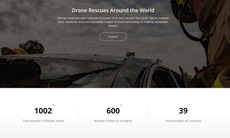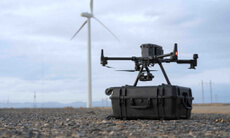DJI Seeks Transport Canada’s Help For Safety Quiz For New Drone Pilots
Drone Maker Says Safety Regulator Should Base Its Rules On Science, Not YouTube
November 7, 2017 – DJI, the world’s leader in civilian drones and aerial imaging technology, on Thursday asked Transport Canada to help improve Canadian drone safety by working with DJI to develop a mandatory Knowledge Quiz for people before they fly a DJI drone for the first time.
The DJI Knowledge Quiz will require drone pilots to correctly answer a series of basic questions about safe drone use before their first flights. The questions will appear in DJI GO 4, DJI’s main flight app, which runs on smartphones and tablets connected to drone remote controllers. The Knowledge Quiz is being rolled out first in the United States, where the Federal Aviation Administration (FAA) helped develop questions based on that country’s drone rules.
“This is to require our customers to pass a test showing that they understand what the rules are for safe operation,” Brendan Schulman, DJI Vice President for Policy and Legal Affairs, said Thursday at the Unmanned Canada 2017 conference outside Toronto. “We did develop our U.S. edition for this with the FAA’s assistance and collaboration. We very much welcome Transport Canada to work with us on what those questions and answers should be, and make sure we’ve got the right nuance.”
Schulman said Canada is falling behind other countries in encouraging drone innovation and the benefits it brings, such as helping businesses operate more efficiently, protecting workers from risky tasks such as tower inspections, and helping police and firefighters protect life and property. He urged Transport Canada to work more closely with the drone industry to develop reasonable regulations and technological solutions to promote drone safety.
“We don’t want to just debate views. We want to come back to, what is the risk that we need to mitigate, and what data do we need? And if there’s data we can provide, consistent with not revealing trade secrets and confidentiality, we’re happy to collaborate on that and figure it out,” Schulman said. “We’ve already done that around the world. Let’s try to provide some information about the systems that could inform reasonable and scientific rulemaking, and not data based on just browsing YouTube.”
When Transport Canada suddenly announced new drone regulations in March, it displayed several DJI drones on a table but did not invite DJI or other leaders in the drone industry to take part in developing or promulgating them.
“When your products are literally on the table, it’s good to have some conversations before things happen,” Schulman said. “We commend Transport Canada in amending the Interim Order making things a little bit better. We are pleased to report that since March we’ve had many good conversations … and continue to work together to find what that right balance is between the safety rules and also the rules that allow and permit innovation to flourish.”
DJI makes an estimated two-thirds of the world’s drones, and its systems for detecting and identifying airborne drones as well as requiring drone pilots to understand safety rules offer new levels of safety and security for Canadians. Unmanned Canada 2017 is Canada’s only national convention of its kind, sponsored by Unmanned Systems Canada, the national nonprofit association representing public and private innovation in unmanned vehicle systems.


